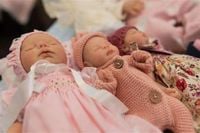The Municipal Chamber of Rio de Janeiro has officially recognized September 4 as the 'Dia da Cegonha Reborn', a day dedicated to honoring the artisans who create hyper-realistic dolls known as reborn babies. The project, officially designated as Law 1892/2023, was approved on May 7, 2025, and is now awaiting the signature of Mayor Eduardo Paes (PSD).
Authored by councilman Vitor Hugo (MDB), the initiative aims to acknowledge the vital role these artisans play, particularly in therapeutic contexts. Vitor Hugo expressed the importance of this recognition in a heartfelt social media post, stating, "We approved the Dia da Cegonha Reborn, an emotional tribute to incredible women in our city. These artisans create realistic dolls used in therapies. Many have faced difficult moments such as depression, mourning, and deep pain, and have found in this work a form of healing and love."
The project highlights the efforts of a group of women from the Instituição Cegonha Reborn, who gathered on September 4, 2022, to advocate for the inclusion of this date in the city's official calendar. According to the proposal, reborn dolls are handcrafted by artisans, known as 'cegonhas', who use techniques to simulate real infant features. The law states, "The birth of a baby is a unique moment in a woman's life, and it is no different for reborn mothers, whose children are sent by 'cegonhas', the name given to artisans who customize dolls to resemble real babies."
Moreover, the proposal underscores the therapeutic potential of these dolls, which have gained traction in various countries as a means of memorializing lost children or as tools for psychological support. The text notes, "There are also reports of cases where they are used as therapy by psychologists to help with mourning and other traumas. In instances of a newborn's death, the reborn baby is utilized for a short period, always under professional guidance, aiding in the healing process for the grieving parent."
The rise of the reborn baby phenomenon has sparked interest and discussion, particularly following the release of the documentary "Bebês reborn não choram" by journalist Chico Barney, which has divided opinions on social media. Despite the controversy, the Municipal Chamber's decision reflects a growing recognition of the cultural and emotional significance of these dolls.
Janaina Affonso, a 47-year-old artisan and founder of the Movimento de Cegonhas Juntas Somos Rosas, played a crucial role in advocating for the recognition of this day. She began her journey into the art of reborn dolls in 2019, inspired by a request from her daughter for a realistic doll that she could not afford. "My father paid for a course for me to learn how to make them, knowing about my passion for crafts," Janaina recalled. Today, she not only creates and sells these dolls but also teaches others the craft remotely.
Janaina shared that the prices for reborn babies range from R$ 500 to R$ 1,800, depending on the materials used. These dolls are not merely consumer products; they serve significant therapeutic and social purposes. For instance, Janaina gifted a reborn doll to a grandmother grieving the loss of her 21-year-old grandson, designed to resemble him as a newborn. She also provided a doll to a mother experiencing "empty nest syndrome" after her children moved out.
In her advocacy, Janaina emphasized the importance of recognition for the artisans, stating, "We need to have our day acknowledged. We are homemakers who dedicate part of our time to reborn dolls, bringing joy to children and comfort to those who have lost a child or cannot have one. Our babies are used for therapy with the elderly, autistic children, and individuals suffering from depression. Many like me live entirely off the reborn art as a source of income, supporting my daughters and showing that education will change our story, especially by valuing reborn art, because this work saves lives."
The movement has gained traction, with various social media profiles showcasing the creation and daily lives of "reborn moms". Videos of these dolls accompanying their owners to medical appointments or engaging with family members have gone viral, further popularizing the phenomenon.
As the approval of the Dia da Cegonha Reborn moves forward, the hope is that it will not only honor the artisans but also raise awareness of the therapeutic benefits of reborn dolls. Psychologist Denise Milk has noted that these dolls can serve as therapeutic tools for women dealing with loss or infertility. She explained, "In many cases, there is indeed a symbolic connection with experiences of loss, emotional deprivation, or even traumas related to motherhood—whether due to absence, difficulty in exercising it, or unrealized expectations. The bond with the doll functions, for some people, as a psychological mechanism for reorganization."
The recognition of the Dia da Cegonha Reborn represents a significant step in acknowledging the cultural and emotional impacts of this unique art form. As the artisans continue to create and share their work, they are not only crafting dolls but also weaving threads of healing and community among those who have faced similar struggles.





